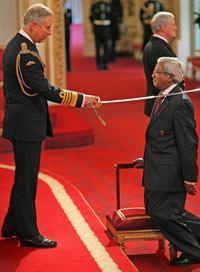商業;商界人物;
BRAC in business
BRAC的商業一面
Fazle Hasan Abed has built one of the world's most commercially-minded and successful NGOs;
法佐·哈桑·阿比德建立了世界上最具商業頭腦的、最成功的NGO組織;
Smiling and dapper, Fazle Hasan Abed hardly seems like a revolutionary. A Bangladeshi educated in Britain, an admirer of Shakespeare and Joyce, and a former accountant at Shell, he is the son of a distinguished family: his maternal grandfather was a minister in the colonial government of Bengal; a great-uncle was the first Bengali to serve in the governor of Bengal's executive council. This week he received a very traditional distinction of his own: a knighthood. Yet the organisation he founded, and for which his knighthood is a gong of respect, has probably done more than any single body to upend the traditions of misery and poverty in Bangladesh. Called BRAC, it is by most measures the largest, fastest-growing non-governmental organisation (NGO) in the world—and one of the most businesslike.
面帶微笑、衣冠楚楚的法佐·哈桑·阿比德怎么看也不像是一個革命者。這個在英國受的教育的孟加拉人是莎士比亞和喬伊斯的粉絲,曾在殼牌公司作過會計,家族顯赫:外祖父是孟加拉殖民政府的一位部長;一位叔祖父是第一個為孟加拉行政會議長官做事的孟加拉人。本周,阿比德得到了加在自己頭上的榮譽——一個很有傳統的稱號:爵士頭銜。然而,他創建的這個組織——他被授予爵士頭銜也是對這個組織的一種敬意——卻顛覆了傳統,改變了孟加拉一直以來的貧窮和困苦,而且在這方面作出的貢獻可能比任何一個單一團體都要多。這個組織叫作BRAC(孟加拉國農村發展委員會),用絕大多數標準衡量都是世界上最大的、成長最迅速的非政府組織(NGO)——而且是最像企業的NGO之一。

Although Mohammed Yunus won the Nobel peace prize in 2006 for helping the poor, his Grameen Bank was neither the first nor the largest microfinance lender in his native Bangladesh; BRAC was. Its microfinance operation disburses about $1 billion a year. But this is only part of what it does: it is also an internet-service provider; it has a university; its primary schools educate 11% of Bangladesh's children. It runs feed mills, chicken farms, tea plantations and packaging factories. BRAC has shown that NGOs do not need to be small and that a little-known institution from a poor country can outgun famous Western charities. In a book on BRAC entitled “Freedom from Want”, Ian Smillie calls it “undoubtedly the largest and most variegated social experiment in the developing world. The spread of its work dwarfs any other private, government or non-profit enterprise in its impact on development.”
雖然2006年獲得諾貝爾和平獎的是穆罕默德·尤努斯,但是他的格萊珉銀行既不是孟加拉第一家也不是最大一家小額貸款銀行;包攬這兩個第一的是BRAC。它的小額貸款業務每年要發放10億美元的貸款。但是這僅僅是它的部分業務:它還是互聯網服務的供應商;它擁有一所大學;它辦的小學解決了孟加拉11%孩子的受教育問題。它還經營飼料加工廠、養雞場、茶葉種植場,還有包裝廠。BRAC的成功表明NGO組織不一定要非常小,而且一個來自窮國、不為人知的機構可以干過西方著名的慈善機構。伊恩·斯邁利在他專門寫BRAC的書《徹底走出饑餓》中將這稱作“在發展中國家中無疑是最大規模且最為斑斕的社會實驗。其社會工程的散播廣度讓其它任何私有的、政府的或是非盈利的企業都相形見拙,為社會發展帶來的影響無人能及。
None of this seemed likely in 1970, when Sir Fazle turned Shell's offices in Chittagong into a refuge for victims of a deadly cyclone. BRAC—which started as an acronym, Bangladesh Rehabilitation Assistance Committee, and became a motto, “building resources across communities”—surmounted its early troubles by combining two things that rarely go together: running an NGO as a business and taking seriously the social context of poverty.
但在1970年卻看不出這些,當時的法佐把殼牌公司在吉大港的辦公址變成了避難所,接納在一次恐怖龍卷風中的受害者。BRAC——分別是“孟加拉,康復,援助,委員會”四個英文單詞的首字母,并且演變成一句口號,“建立跨社區資源”——克服了早期遇到的困難,辦法是將兩件很少能并置的東西結合到了一起:1.像做生意一樣運作一個NGO;2.認真對待貧窮的社會環境。
BRAC earns from its operations about 80% of the money it disburses to the poor (the remainder is aid, mostly from Western donors). It calls a halt to activities that require endless subsidies. At one point, it even tried financing itself from the tiny savings of the poor (ie, no aid at all), though this drastic form of self-help proved a step too far: hardly any lenders or borrowers put themselves forward. From the start, Sir Fazle insisted on brutal honesty about results. BRAC pays far more attention to research and “continuous learning” than do most NGOs. David Korten, author of “When Corporations Rule the World”, called it “as near to a pure example of a learning organisation as one is likely to find.”
BRAC向窮人發放的錢款中有80%來自其自主經營(剩下的來自捐助,大多是西方的捐助者)。它會叫停那些無休止依賴捐助的項目,甚至還曾一度試著通過窮人的點滴存款來為自己融資(換種說法就是不依賴丁點捐助),盡管這種極端的自助形式后被證明走的太遠:幾乎沒有人主動來存錢或貸款。從一開始,法佐就堅持公開透明,對于經營業績毫不隱瞞——即使是很壞的業績。BRAC對于調研和“持續學習”的注重要遠勝于大多NGO組織。《當企業統治世界》的作者大衛·科爾頓把BRAC稱作“可能是能夠找到的最為純粹的學習型組織”。
What makes BRAC unique is its combination of business methods with a particular view of poverty. Poverty is often regarded primarily as an economic problem which can be alleviated by sending money. Influenced by three “liberation thinkers” fashionable in the 1960s—Frantz Fanon, Paulo Freire and Ivan Illich—Sir Fazle recognised that poverty in Bangladeshi villages is also a result of rigid social stratification. In these circumstances, “community development” will help the rich more than the poor; to change the poverty, you have to change the society.
BRAC之所以能夠獨樹一幟,在于它的經營手法是與其看待貧窮的獨特觀點相結合的。貧窮在多數時候被首先看作是經濟問題,可以通過發放金錢得到緩解。因為受到在1960年代很流行的三位“解放式的思想家”——弗朗茲·法農、保羅弗·萊雷和伊凡·伊里奇——的影響,法佐認識到孟加拉國農村的貧窮問題是源于嚴格的社會層級。在這樣的環境下,“社區發展”對于富人的幫助要勝于對窮人的幫助;為了改變貧窮狀態,你必須改變社會。
That view might have pointed Sir Fazle towards left-wing politics. Instead, the revolutionary impetus was channelled through BRAC into development. Women became the institution's focus because they are bottom of the heap and most in need of help: 70% of the children in BRAC schools are girls. Microfinance encourages the poor to save but, unlike the Grameen Bank, BRAC also lends a lot to small companies. Tiny loans may improve the lot of an individual or family but are usually invested in traditional village enterprises, like owning a cow. Sir Fazle's aim of social change requires not growth (in the sense of more of the same) but development (meaning new and different activities). Only businesses create jobs and new forms of productive enterprise.
這樣的觀點本來可能會指引法佐走向左翼政治。而實際情況是,這種革命動力經BRAC的催化轉換成了實實在在的發展。婦女成為了這個機構的主要關注對象,因為她們身處最底層,且最需要幫助:BRAC辦的小學里70%是女生。小額貸款鼓勵窮人存錢,但是和格萊珉銀行不同之處在于,BRAC也把錢借給小公司。小額貸款可能會改變一個人或是一個家庭的命運,但是這些錢通常都被投資在傳統的農村致富項目上,比如養牛。法佐改變社會的目標靠的不是增長(是指“同類項目越來越多”),而是發展(意思是“新的不同的生意”)。只有生意才能創造就業就會,才能產生新形式的、生產力強的企業。
After 30 years in Bangladesh, BRAC has more or less perfected its way of doing things and is spreading its wings round the developing world. It is already the biggest NGO in Afghanistan, Tanzania and Uganda, overtaking British charities which have been in the latter countries for decades. Coming from a poor country—and a Muslim one, to boot—means it is less likely to be resented or called condescending. Its costs are lower, too: it does not buy large white SUVs or employ large white men.
經過在孟加拉30年的發展,BRAC對于自己這套業務之道已多少達到完善,并且正在將觸角伸向其它第三世界國家。它已經超過英國的慈善機構,成為阿富汗、坦桑尼亞、烏干達這幾個國家中最大的NGO組織,而后者已經在這些國家經營了幾十載。因為是來自窮國——還是一個穆斯林國家,這意味著BRAC不大可能遭人反感,或被形容為“居高臨下的恩施”。它的花銷也同樣很低:沒有大型的白色越野車,也沒雇傭高大的白人。
Its expansion overseas may, however, present BRAC with a new problem. Robert Kaplan, an American writer, says that NGOs fill the void between thousands of villages and a remote, often broken, government. BRAC does this triumphantly in Bangladesh—but it is a Bangladeshi organisation. Whether it can do the same elsewhere remains to be seen.
然而,BRAC在海外的擴張面臨著一個新問題。美國作家羅伯特·卡普蘭說,NGO組織填補了一個遙遠且經常失靈的政府和成千村莊之間的空白地帶。BRAC在孟加拉勝利地做到了這一點——但是它是孟加拉的組織。它在其它地方也能這樣嗎?還有待結果告訴我們。












